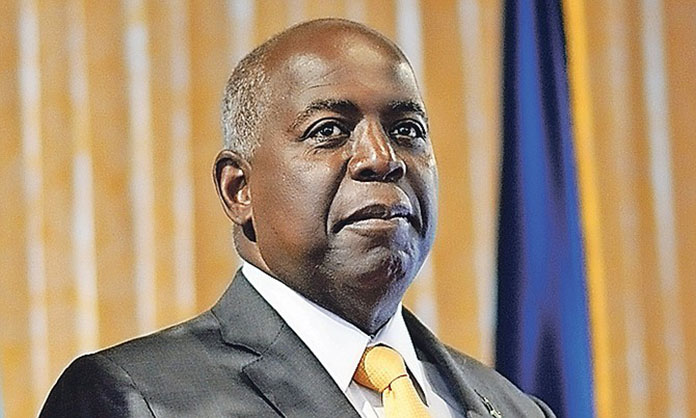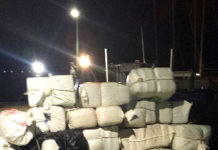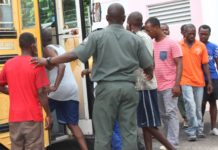
By Leader of the Opposition, Philip Brave Davis
Monthly PRESSER BY OPPOSITION
Welcome to all of you. I thank you for joining me this afternoon.
THE SHADOW CABINET
Before we start, I wish to advise that with the addition of Mr. Vaughn Miller to our parliamentary caucus, the new Shadow Cabinet is as follows:
The Hon. Philip Davis MP: Prime Minister’s portfolio, Urban Development, Bahamas Power and Light, Bahamasair and the Ministry of Works.
Mr. Chester Cooper MP: Finance, Financial Services and Industry, National Insurance.
Mrs. Glenys Hanna Martin MP: Social Services, Transport, Aviation, National Security.
Mr. Picewell Forbes MP: Environment, Housing, Sports and Culture.
Mr. Vaughn Miller MP: Tourism and Natural Resources.
Senator Fred Mitchell: Foreign Affairs, Labour, Attorney General and Legal Affairs, Immigration and Trade
Senator Michael Darville: Health, National Health Insurance, Grand Bahama
Senator Clay Sweeting: Agriculture, Local Government, Marine Resources.
Senator Jobeth Davis: Education, the Public Service and Youth.
In the first instance, inquiries on matters of public interest related to these portfolios and the views of the Progressive Liberal Party on those portfolios should be referred to these individuals.
COVID-19 Crisis
In his nationally televised address on COVID-19 Sunday, 4 October 2020, THE Prime Minister threw up both hands and conceded to the nation that his strategy to manage and contain the community spread of COVID-19 have failed and in a last ditch effort, he has invited PAHO/WHO to advise his government on the way forward.
He conceded that the healthcare system is overwhelmed, COVID-19 deaths are averaging one per day and the positivity rate is unacceptably high. The latest dashboard indicates a positivity rate of 20.6 percent, well above the World Health Organization’s threshold of 5 percent as a measurement of success. The Bahamas continues to rank at the bottom of countries globally in its performance to contain and manage COVID.
The PLP is again disappointed that the Prime Minister took the opportunity again to blame this escalation in the spread of COVID-19 on the behavior of the Bahamian people when his government has not done enough to provide the requisite public education and sanitizing material to more effectively fight and mitigate the spread of this virus.
We do, though.
Today, we submit a series of recommendations for steps the government can take almost immediately. It is not a comprehensive national plan; we lack full access to the national data and information available to the government. However, it is based on scientific developments and a review of best practices in countries that have had far more success than ours.
Action Plan to Combat COVID-19 in The Bahamas
1. Test: Free Testing for All Bahamians.
Every Bahamian has a right to be tested for COVID-19, and the testing should be free. This is the right thing to do, and it is the smart thing to do.
A major error made by this government has been to focus testing only on symptomatic individuals.
The US Centers for Disease Control and Prevention (CDC) estimates that nearly 50% of COVID-19 transmission occurs before the onset of symptoms.
That means in The Bahamas, by the time we’ve tested someone, and returned their results, they’ve likely already passed the virus to many other Bahamians.
In addition, 40% of COVID-19 infections are asymptomatic – that means people have the virus, but don’t know they have it, and don’t know they’re spreading it.
No wonder cases keep growing here.
The PLP’s COVID-19 Task Force has repeatedly called for a substantial expansion of testing. As we have said since April, testing is the only way to make an invisible virus visible.
If any Bahamian suspects they may have been exposed to the virus, they should be able to get tested for free and those results should be returned quickly. We should be encouraging and supporting testing, not throwing up obstacles. The ability to keep yourself and your family and co-workers safe should not depend on your ability to pay for a test. It is a serious hardship for most Bahamians to isolate themselves from family and from their places of work. Most will not do so without a positive test result.
Would this be expensive to implement? Yes. But not as expensive as the failure to stop COVID has been.
We need a substantial increase in the personnel and resources devoted to testing. Testing centres should be established across our islands with a special focus on emerging hotspots.
Rapid antigen testing can be one part of our testing arsenal in order to identify positive cases quickly.
2. Trace: Expand Contact Tracing.
I know people, and I’m sure you do too, who tested positive for COVID-19 and were never asked for a list of the people with whom they had been in contact during the days they were most infectious.
I know the contact tracers are working hard. They have our gratitude. But they deserve reinforcements. The government has not hired and trained enough people to keep up. Unless contacts are reached quickly, the exercise is futile. At a minimum, we need 250 contact tracers in Nassau, 50 in Grand Bahama, and 10 each in Bimini, Eleuthera, Abaco and Exuma. All islands with significant hotel properties will need local plans for contact tracing and testing.
3. Isolate.
People who have been identified as COVID-positive must be isolated from others. Some Bahamians are able to do so in a room within their homes, but for others this is impractical or even impossible. We need to establish a government facility where people can safely stay until they are no longer shedding the virus. This way we can protect the people they live with and stop community spread. *
4. Treat.
All clinics on all islands must be equipped with all necessary medical supplies, including oxygen tanks, to support COVID positive patients until they can be evacuated.
I hope that the government has made efforts to secure therapeutic medicines for Bahamians, to reduce the severity of COVID and to reduce the course of the illness.
5. Protect.
We need to increase resources to hospitals and clinics. Our nurses and doctors have been asking for more support: more PPE, more beds, more staff, more protection for non-COVID patients. They deserve this much at least.
It has been nearly impossible to follow the shifting stories and contradictions from government ministers about the use of Breezes to expand capacity. We need more beds. The government needs to work it out.
There are doctors and nurses sitting at home instead of reinforcing our front lines. Why is this?
We need to get them to work as soon as possible.
* (Note the difference between quarantine and isolation. Self-quarantine is done because one might be positive. Isolation is for those who are confirmed positive).
6. Educate, Ventilate, Filtrate.
Very important information has emerged about how COVID-19 is transmitted but the government has failed to update protocols and educate the public.
There is now overwhelming evidence that the inhalation of small virus particles called aerosols is a major transmission route for the coronavirus. This has important implications for determining effective control strategies and for offering guidance to workplaces and individuals.
Viruses transmitted by droplets (distinguished by size) are heavier and typically fall to the ground within about 6 feet of their source; that is the source of the recommendation for physical distancing between people. But viruses in aerosols are smaller and lighter and can remain suspended in air for hours, and then inhaled. Aerosols containing infectious virus can accumulate in poorly ventilated indoor air and lead to superspreading events.
The government should move quickly to prioritize protecting against airborne transmission.
This means emphasizing the importance of moving as much activity as possible outdoors, and improving indoor air in schools, homes, workplaces and government buildings using ventilation and air filtration.
This is not a minor thing the government has overlooked. They have failed to explain and act on crucial information about how the virus is transmitted.
7. Build Trust with Transparency and Fairness.
The Bahamian people have lost trust in the government because of their lack of transparency and fairness. This is because of the way that the country has been held hostage to the whims of a single man. Once again, a truly Competent Authority should be appointed, comprised of experts and others, who can make better decisions, and act with greater transparency and fairness.
I now turn to other urgent matters facing the country.
THE STATE OF HEALTHCARE FACILITIES
The comment the Prime Minister made about the state of healthcare facilities is an admission of a colossal failure in leadership, given the blueprint for healthcare development contained in the NHI strategy and business plan. He undermined, stopped, reviewed and scuttled NHI and that is a critical and significant reason why our healthcare system is currently overwhelmed by this COVID-19 pandemic.
The completed PPP plan complete with economic projections for a new hospital in Grand Bahama was handed to the FNM in 2017 and they sat on the plan. Critically and chronically ill patients have to be transferred to Nassau for treatment, further burdening the Princess Margaret Hospital. To add insult to injury, the government was slow to act on the projects it met in place designed to expand and upgrade the physical plant of our healthcare system.
Bahamians everywhere are saying that because of neglect – much of it confirmed by the nurses union – they are being advised against using the public health system because it is seen as unsafe and unreliable. The Bahamian people have lost confidence in our public health system because of poor decisions by this government. This sorry state of affairs is a management issue; this is a leadership issue and the Prime Minister, a medical doctor, has failed the Bahamian people badly in this critical area – the health and wellbeing of a nation.
A PERMANENT REGISTER OF VOTERS
To be absolutely clear, the Progressive Liberal Party and I support the creation of a Permanent Register of Voters. There should be no doubt on this position.
The Government’s apparent rush to quickly create a Permanent Register, without ensuring that it serves the purpose of advancing the ease and security of the voting process is firstly offensive to Article 70 of the Constitution; it is clearly fraught with opportunity for serious mistakes as the exercise lacks the requisite population census required every decade. The PLP warns that such a major undertaking ought to be approached with appropriate care and attention to detail to avoid unnecessary errors causing people to become concerned for the integrity of such an important tool in our democracy.
Under the current conditions, the Parliamentary Registrar will have to use outdated information to carry out their Constitutional duties.
I have registered the PLP’s concerns in writing to the Attorney General, the Minister of National Security, the Parliamentary Registrar, the Law Reform Commissioner and the Prime Minister.
Additionally, we have done so through our participation in virtual presentations.
We do not need a new Register of Voters for any election which takes place by the middle of October 2021. The Parliamentary Commissioner will readily confirm this.
There is no need to rush to create a Permanent Register of Voters. If there are compelling reasons to rush this process, the government must inform and make its case to the Bahamian people.
What we do need is an approach for citizens who have had to move their place of residence during the past year, either owing to Hurricane Dorian or the severe loss of income from the COVID-19 pandemic, and the thousands of young people who turned eighteen since the last election to be included on the current register.
These two aspects are where the focus ought to be – providing a safe, secure and convenient process for everyone not properly on the current register to be listed.
We have indicated that study has to be executed in order to offer innovative registration measures, being mindful of the serious challenges created by the COVID pandemic. No citizen should be placed in harm’s way or have cause for concern that participation in a project would endanger them in any way.
In short, we are required to produce a register of the highest standard of reliability and integrity. This is especially so in these uncertain times. It would be grossly irresponsible of any party or official to implement a procedure or process which People do not believe is dependable.
BAHAMIANS ARE ENCOURAGED TO REGISTER EARLY
I take this opportunity to appeal to all eligible voters to go and register at your earliest convenience. I make a special appeal to young Bahamians and first time voters who turned eighteen after 10 May 2017 to register to vote. Bahamians who have been displaced by Dorian, COVID-19 or otherwise relocated, are asked to transfer to their new constituency as soon as possible.
Our aspirant candidates and generals have been on the ground for several years. I cannot stress the importance of vigilance in knowing who your constituents are and where they live. All irregularities must be brought to the attention of the relevant authorities and the general public if necessary.
Remember, you cannot make a difference; you cannot effect change and you cannot participate in the electoral process unless you are registered to vote so get out and get registered.
Thank you so much for your kind attention.
I will now entertain a few questions.
END







